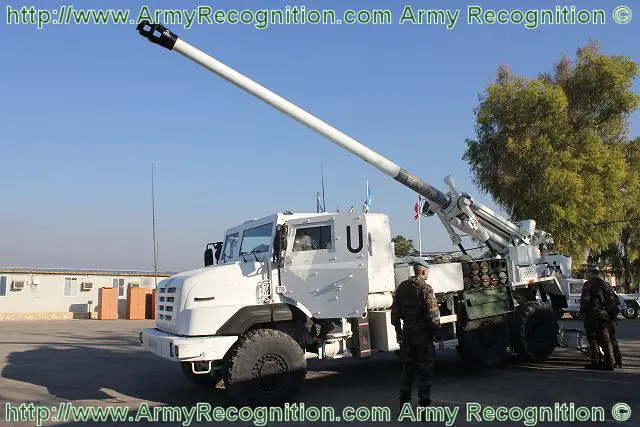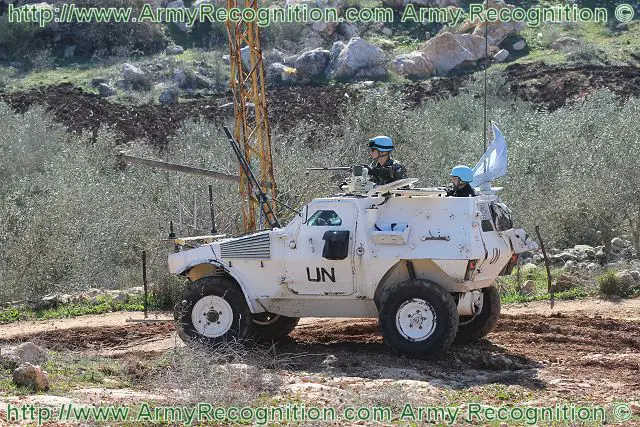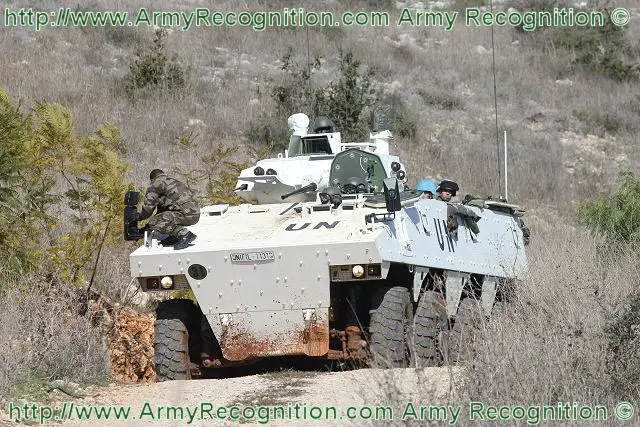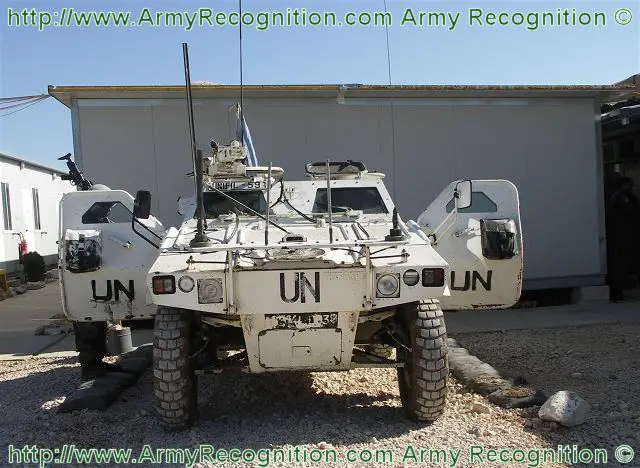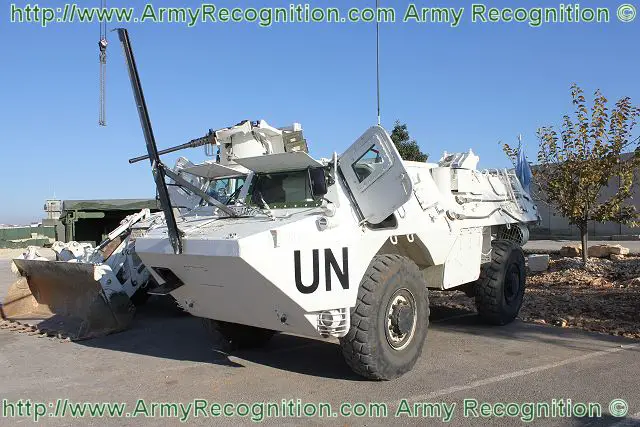French army armed forces equipment and combat vehicles in the UNIFIL mission in Lebanon
| a | |||
French Armed Forces in Lebanon |
|||
| Friday, January 27, 2012, 06:17 PM | |||
| French armed forces equipment and combat vehicles in the UNIFIL mission in Lebanon. | |||
In
December 2011, Army Recognition magazine reporter team was in Lebanon
to cover the SMES 2011 defence Exhibition in Beyrouth. During our trip,
we also visited the French Army troops which are deployed as members of
the UNIFIL (United Nations Interim Force in Lebanon). Analysis of Army Recognition online defense magazine about the military equipment, combat systems and armoured vehicles use by the French Army troops and their role in Lebanon. |
|||
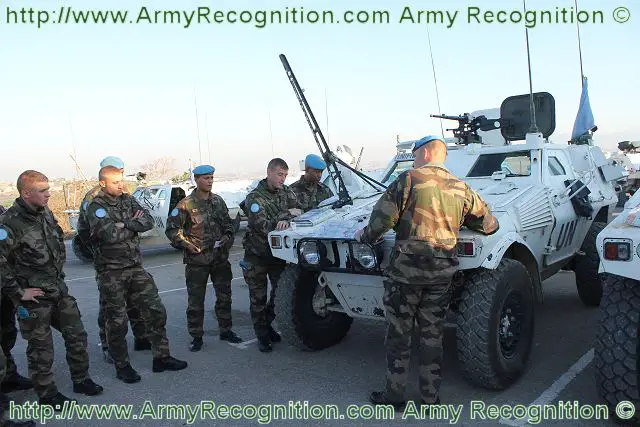 UNIFIL French army peacekeepers during a briefing before a patrol in South Lebanon. |
|||
| |
|||
The
UNIFIL was created by the United Nations, with the adoption of Security
Council Resolution 425 and 426 on 19 March 1978, to confirm Israeli withdrawal
from Lebanon which Israel had invaded five days prior, restore international
peace and security, and help the Government of Lebanon restore its effective
authority in the area. |
|||
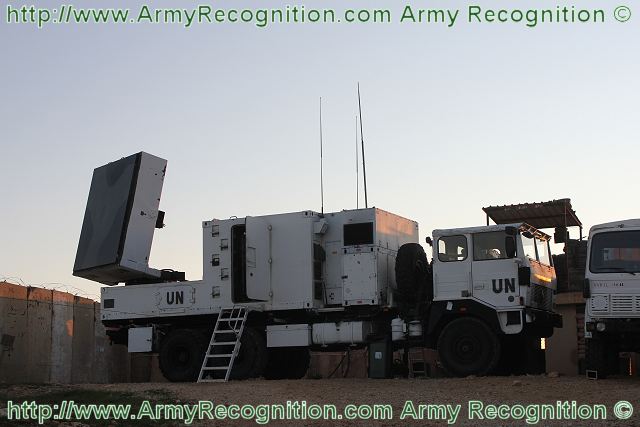 The COBRA system consists of high performance radar, an advanced processing system, and a flexible command, control and communications (C3) system to detect enemy artillery location. |
|||
|
In its missions, the French army is responsible for
controlling all movements of troops, vehicles and rocket attacks that
could come from southern Lebanon or Israel. To fulfill this mission, the
French army deployed its Cobra radar. The Cobra (Counter Battery Radar)
is a 3-D Phased Array Radar that was developed for Germany, France and
the UK.
The COBRA system consists of high performance radar, an advanced processing system, and a flexible command, control and communications (C3) system to detect enemy artillery location. The critical data is provided to friendly indirect fire units in order to be counter attack. In the French army, all the COBRA elements are mounted on a Renault truck TRM10000 requiring only a crew of 3 to run the whole system. More than 40 six-gun batteries can be located and reported to a higher command through a Command, Control and Communications (C3) subsystem in less than two minutes. Simultaneous with enemy battery location missions and impact point prediction, COBRA can be tasked to perform friendly fire registration by tracking counter-fire projectiles and providing necessary correction parameters. The
COBRA system can be operational in less than 10 minutes once the carrier
vehicle is stopped. Likewise it can shut down and start moving in just
3 minutes. The COBRA counter-battery radar meets the needs of Germany,
France and the United Kingdom. Its advanced design allows to be integrated
into existing defense networks achieving enhanced performance. |
|||
The
French are the only members of the UNIFIL to be equipped with heavy artillery
weapons. In the beginning, after the 2006 Israel-Lebanon conflict and
following the cease-fire, the UNIFIL received vast reinforcement, up to
15,000 men, and heavy equipment. France is committed to increase its troops
from 400 to 2,000 soldiers and sent Leclerc main battle tanks, AMX
30 AuF1 self-propelled artillery howitzer and AMX-10P
armoured infantry fighting vehicle.
Tracked vehicles have shown that they had difficulties to move in mountainous areas, where roads are narrow, and in small villages. This type of vehicle is also seen by the population more much more aggressive than wheeled armored vehicles. French command decided to replace the tanks and tracked howitzers with wheeled vehicles such as Nexter ‘s VBCI and wheeled self-propelled howitzer CAESAR. The French force in Lebanon also has for mission to provide artillery support if necessary for all other members of UNIFIL, with its wheeled artillery howitzer CAESAR which is very mobile and can quickly be put in a battery in a very short time. The CAESAR ( CAmion Equipé d'un Système d'ARtillerie - Truck equipped with an artillery system) is a 155 mm/52-calibre gun-howitzer installed on a 6X6 Renault or Unimog truck chassis. The CAESAR is fitted with the FAST-Hit computerized fire control system, muzzle velocity radar and navigation system with Global Positioning System. It provides onboard terminals for communication and firing sequence management. This howitzer can be set into and out of action in less than one minute. |
|||
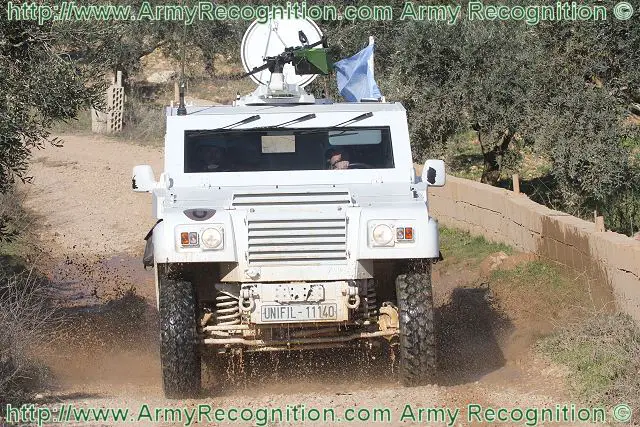 The new PVP Panhard Light Protected Vehicle is now the standard light tactical vehicle of the French Army. |
|||
For
patrol operations, the French forces mainly use the VBL
armored vehicles from Panhard, the PVP
from Panhard, the
VAB personnel carrier from Renault Trucks Defense
and the new wheeled armored infantry fighting vehicle VBCI from Nexter.
We
were embedded with the French troops on patrol in southern Lebanon, particularly
in mountainous areas and off-road. The Panhard VBL showed an excellent
mobility in off-road conditions, despite its many years of service, and
was able to travel in areas where other military vehicles were blocked.
The Panhard
PVP and the VBCI also demonstrated high mobility in off-road
conditions, but with more engine power and greater comfort for the crew
than the VBL. |
|||
Many
vehicles of the French UNIFIL forces are equipped at the front with counter-IED
jammers, (antennas in the front) to protect vehicle operating in high
threat environment. Some Sherpa logistic trucks from Renault Trucks are
fitted with a new armoured cabin to increase the protection of the crew
against improvised explosive device and firing of small arms and RPG rocket
launcher type. |
|||
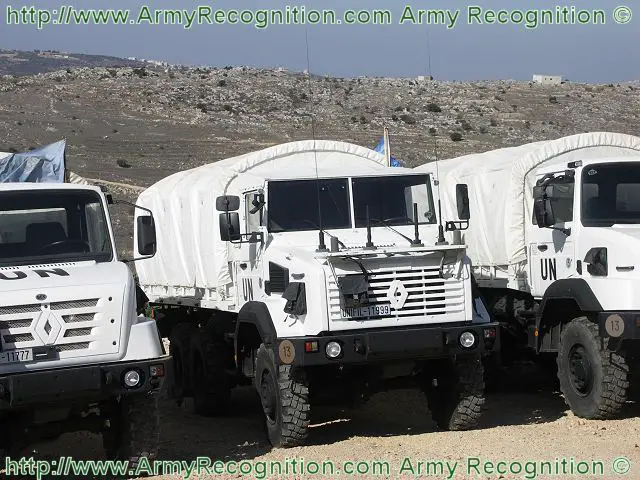 Logistic vehicles are also targets for IEDs. These Sherpa truck is equipped with jamming system against IED, mounted at the front of the engine compartment. |
|||
Mine
action in Lebanon became internationally recognized only after Israel
withdrew its forces in May 2000. After more than 20 years of internal
strife and Israeli occupation, Lebanon remains littered with hundreds
of thousands of landmines and UXO (Unexploded ordnance), including cluster
munitions. Since 1975, 898 people were killed and 2,943 were injured as a result of unexploded ordnance and mines. Although clearance of some highly impacted communities and success in mine risk education has reduced the casualty toll by 75 percent from 2000 to early 2006, mines and UXOs continue to kill and maim people in Lebanon. Another mission of the French troops in Lebanon is the mine clearance of the country following the war against Israel. During our coverage, we have been able to attend a comprehensive overview over the missions, equipment and vehicles during a presentation by the French engineer troops in the UNIFIL mission. |
|||
The
French engineer units have also the following tasks: - Support for mobility of UNIFIL with opening of axis of progression - Perform work of protection to military camps and isolated units - construction works of buildings and facilities of French units - provide the support in electrical energy for French troops - improvement of paths and roads for the UNIFIL troops To ensure its missions, the French engineer units have different means, ranging from armored vehicles and also cranes, bulldozers and construction machinery. |
|||
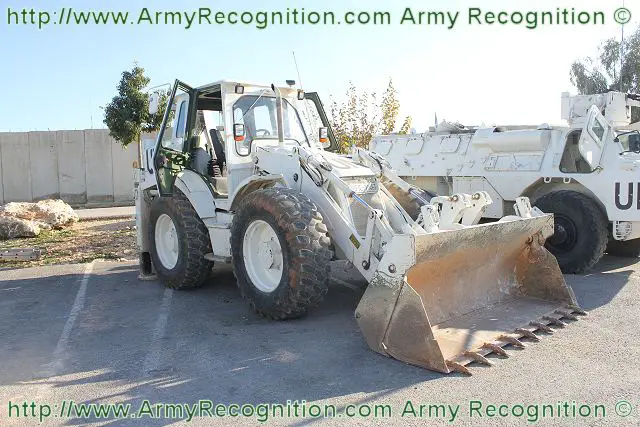 French engineer combat bulldozer with armour cabin. |
|||
|
The sky is always a threat for the armed forces especially
with the new combat UAV (Unmanned Aerial vehicle) which can be armed with
missile and bombs.
Experts and media have been discussing the potential use of UAVs for terrorism for some time. Until recently, this threat was considered to lie primarily in the conversion of anti-ship cruise missiles or small manned airplanes to land attack missiles. Previous studies focused on threats from so-called "states of concern" rather than non-state actors. A broader spectrum of possible terrorist uses has been addressed since September 11, 2001. Experts
point to a set of advantages that may make UAVs seem attractive to terrorists:
French army compound of UNIFIL are regularly over flown by drones from Israel, which are detected by air defense teams equipped with the Mistral Pamela short range air defense missile system coupled to the Samantha radar air defence early warning and command & control unit. Basically the Mistral Pamela is mounted on a Renault TRM 2000 light truck. |
|||
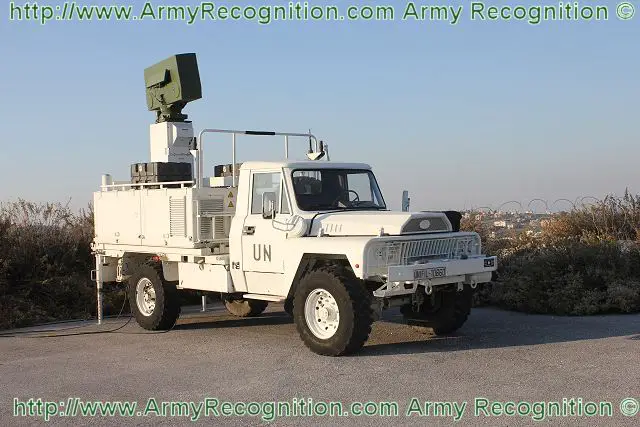 The Samantha is the radar detection unit for the Mistral short range air defence missile system. The radar is mounted at the rear of the light truck VLRA ACMAT. |
|||
The
Samantha radar has a tactical detection range of 30 kilometers and engagement
ranges of 20 and 10 kilometers against aircraft and hovering helicopters
respectively. SAMANTHA can track up to 16 targets simultaneously and coordinate
up to eleven Mistral firing units. The radar can be controlled remotely
from a secondary operating post at a distance of up to 400 metres from
the main radar station. The aim of this secondary operating position is
to avoid casualties during anti-radiation missile attacks against the
radar. |
|||
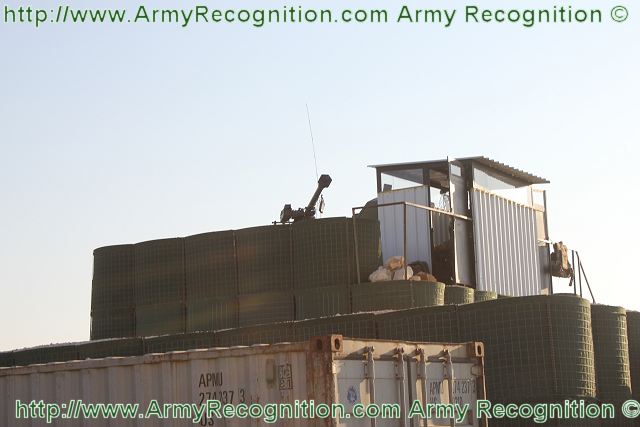 At the French camp area in Lebanon, the Mistral is installed on modular observation tower, to increase the visibility and the reaction for Mistral combat teams. |
|||
At
the French camp area in Lebanon, the Mistral is installed on modular observation
tower, to increase the visibility and the reaction for Mistral combat
teams. All mistral launcher units are protected by a VAB armoured vehicle
personnel carrier armed with a 20 mm gun which are used also to fire warning
shots against aerial threats. The Mistral launcher unit is equipped with the new Matis MP3 optronic aiming sight designed and manufactured by Sagem (Safran group). The MATIS imagers use cooled infrared technology in the 3-5µm spectral bandwidth, combined with a focal plane array, a highly reliable micro-cooler and highly integrated electronics. MATIS’s latest-generation Focal Plane Array (FPA) provides thermal sensibility and incomparable image quality. These characteristics make MATIS imagers particularly reliable and lightweight, with performance, compactness and cost optimized peerlessly. With this sight system the Mistral teams are able to make observation in day or night conditions with more accuracy. |
|||
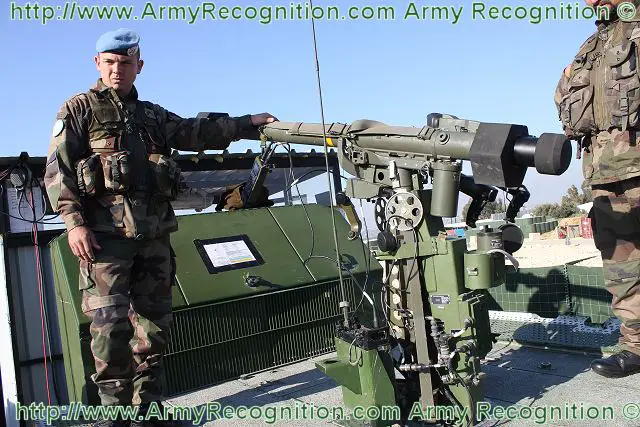 The Mistral is a short range air defence missile system, normally the missile launcher system is mounted at the rear of Renault TRM 2000 light truck. |
|||
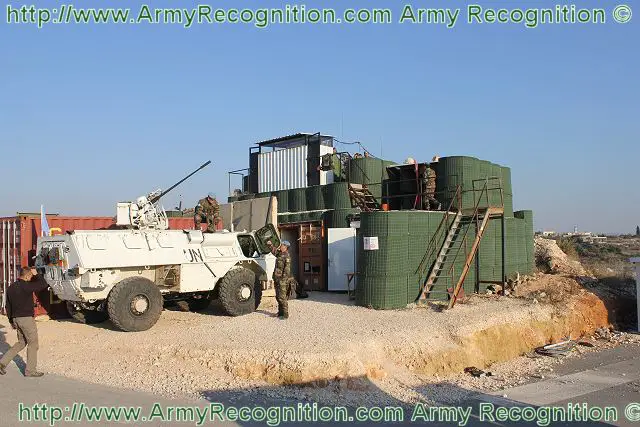 All mistral launcher unit are protected by a VAB armoured vehicle personnel carrier armed with a 20 mm gun which are used also to fire warning shots against aerial threats. |
|||
|
I would like to thank all the officers, NCOs and soldiers
of the French UNIFIL units that allowed the realization of this press
coverage and our protection.
I am grateful particularly to Colonel Du Gardin, Commander Officer of the 1° RTir (Régiment de tirailleurs), Colonel Tissier of the 35° RI (Infantry Regiment) and Capitaine Courot Press officer of the 1° RTir for their hospitality in the all French units of UNIFIL |
|||



























